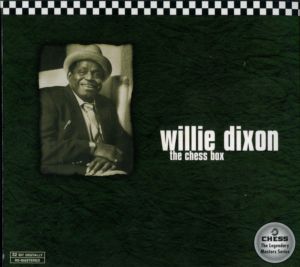
- Format: FLAC

This was the most unusual, and probably the most difficult to assemble of MCA's Chess Box series, mostly because of the unusual nature of Willie Dixon's contribution to Chess Records. To be sure, Dixon rates a place in the history of the label right alongside that of Muddy Waters, Howlin' Wolf, and Little Walter, but his role was more subtle than that of a performer (indeed, two of the half-dozen recordings here that feature Dixon as a singer were previously unreleased). So he is all over this two-CD set, as a songwriter, producer, and bassist, and occasionally as a singer as well, but the unifying element are the Dixon songs, and he is the only blues songwriter to be honored by a major label with a retrospective of this type. Since he was not the performer on most of this material, but, rather, was working to mesh his material with the styles and sensibilities of a vast range of players, the sounds contained on these two CDs are a lot more varied than on any of the other Chess Box releases — amplified Delta blues, big band, Mills Brothers-style harmony blues, jazz-influenced jump blues, and near-pop style R&B are all here; guitar pyrotechnics by Muddy Waters or Hubert Sumlin (on the Wolf's records), vocal acrobatics by Little Walter, and rippling performances by Koko Taylor illuminate this set throughout. While some of it, such as Muddy Waters' single of "Hoochie Coochie Man"; Little Walter's "My Babe"; Howlin' Wolf's performances of "Evil," "Spoonful," "Little Red Rooster," and "Back Door Man"; and Lowell Fulson's version of "Do Me Right" are easily available elsewhere, a lot else of what's here is genuinely rare and most enticing — Dixon's own renditions of "Violent Love," "Crazy For My Baby," and "Pain In My Heart," in particular, are great records, lacking perhaps only a slight measure of the energy that a Muddy Waters brought to recording. Most of the set is concentrated on his blues work — a pair of hot Bo Diddley sides ("Pretty Thing," "You Can't Judge a Book by Its Cover") that Dixon wrote are represented, but since he didn't write anything for Chuck Berry, that side of Dixon's history is left out, despite his having played bass on most of Berry's early recordings. Still, it's difficult to imagine anyone complaining over an "excuse" to bring some of the best sides of Muddy, Walter, the Wolf, Diddley, Taylor, Lowell Fulson, Jimmy Witherspoon, Sonny Boy Williamson, Otis Rush, and even Dixon's own '40s outfit, the Big Three together in one release. The sound is impeccable, holding up to standards even a dozen years later, and the set includes a well-illustrated and annotated booklet.